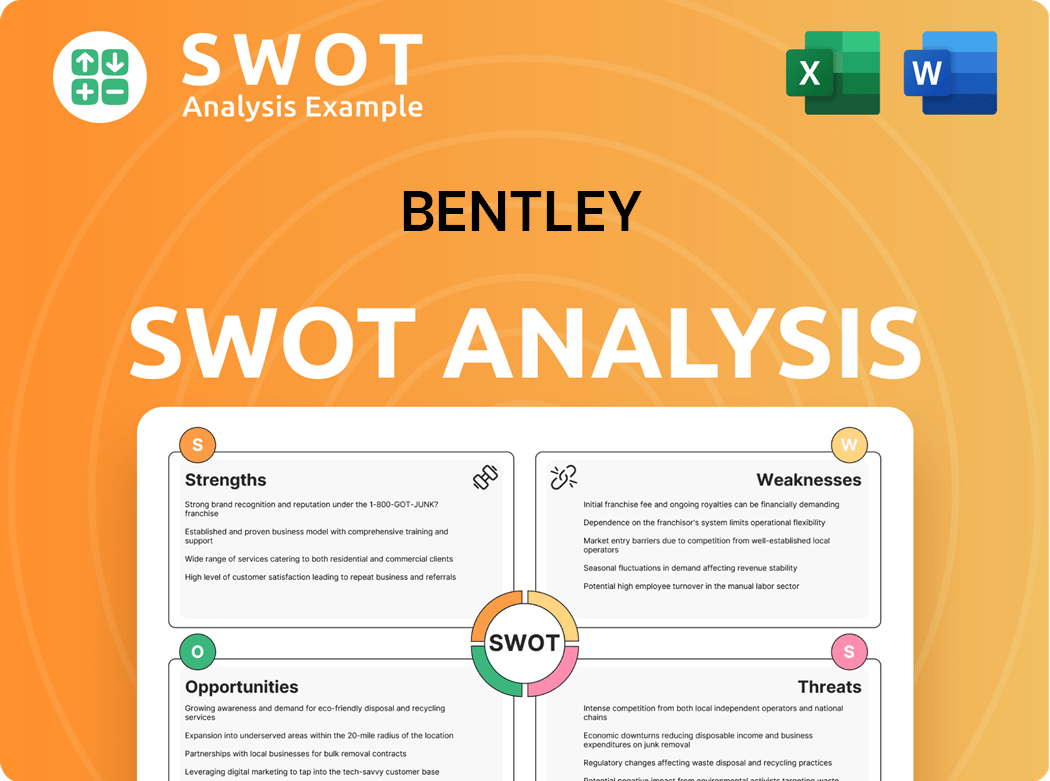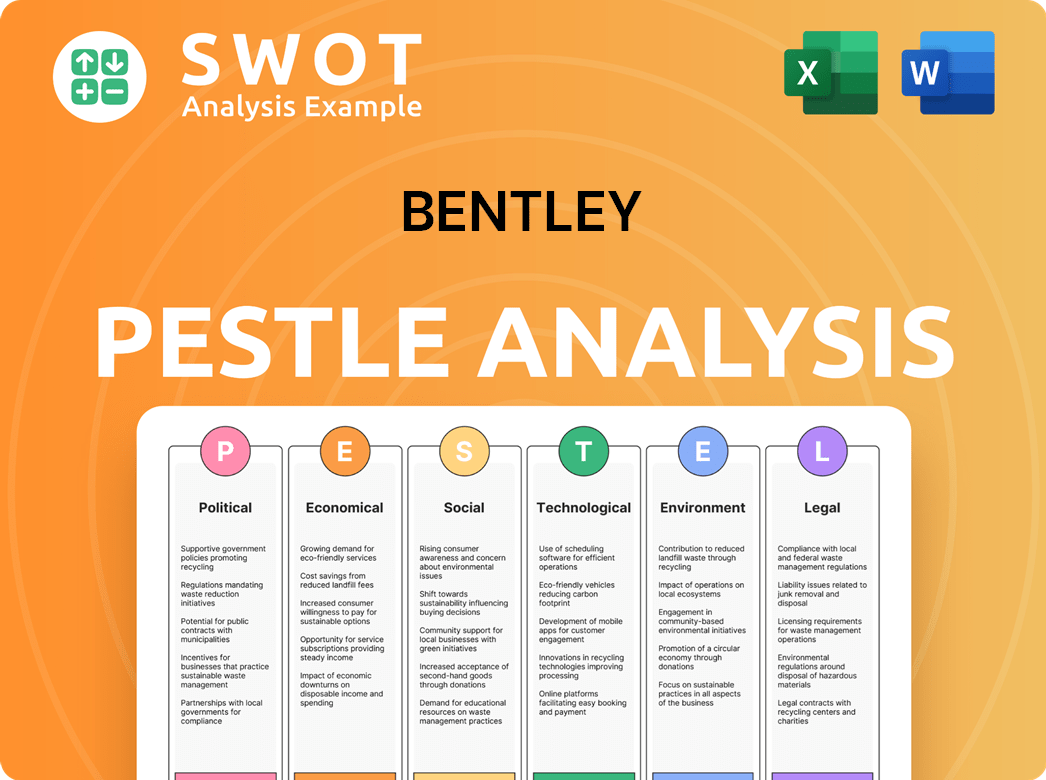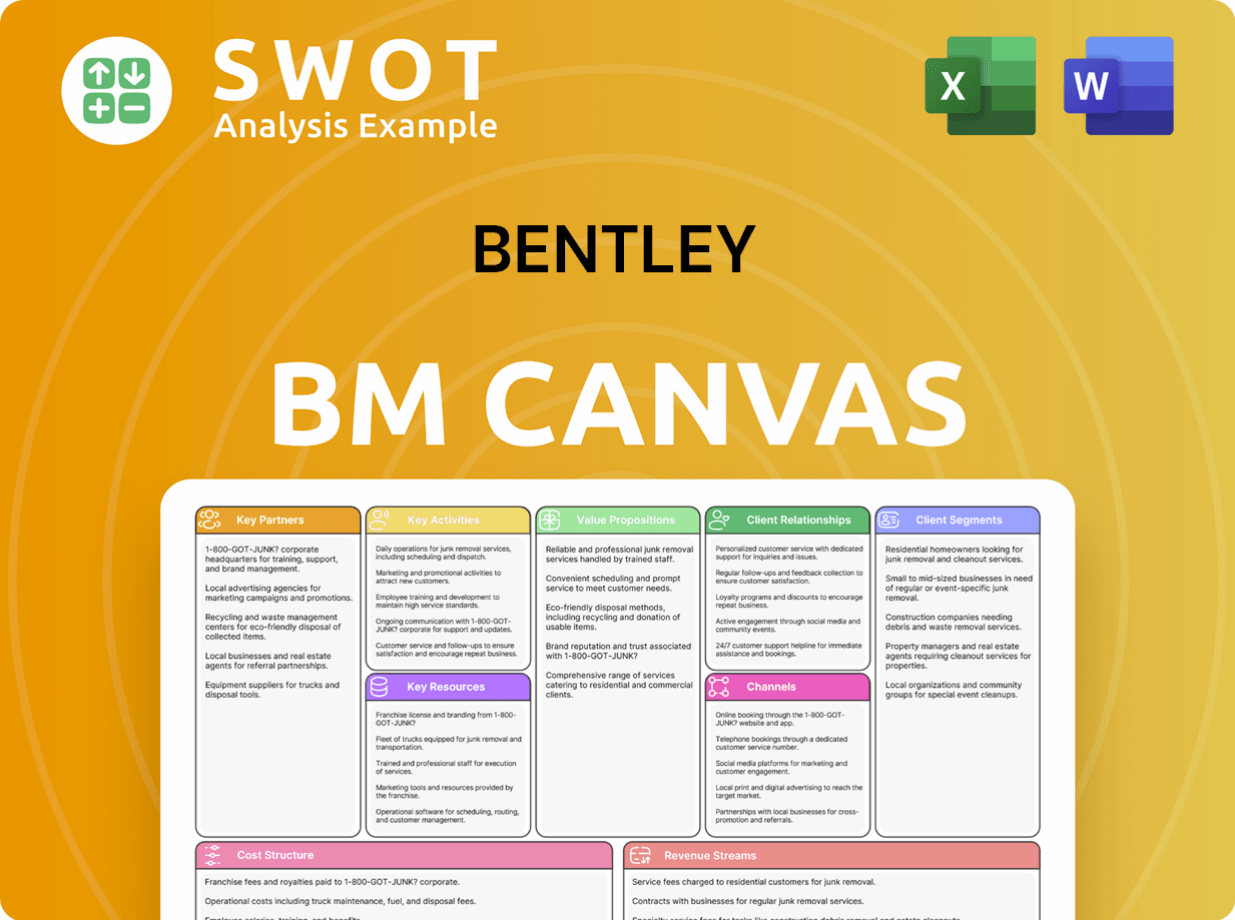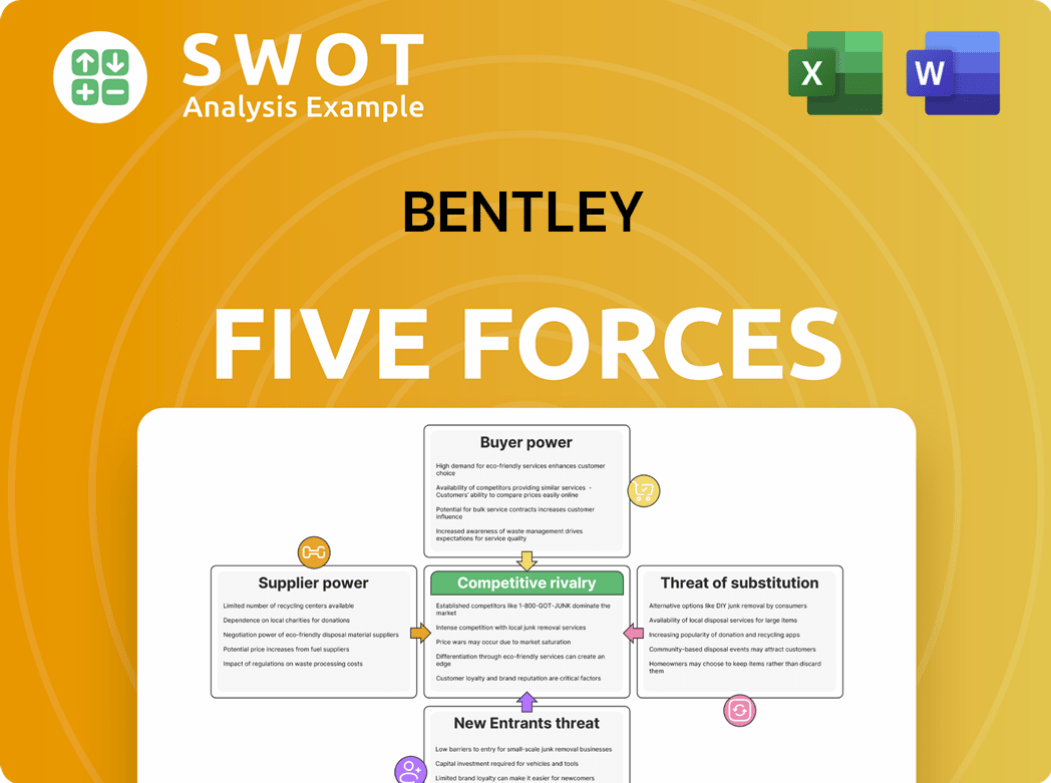Bentley Bundle
How Does Bentley Drive Sales and Captivate Customers?
Founded in 1984, Bentley Systems has become a global leader in infrastructure software. From its early days, the company's approach has evolved significantly, adapting to market demands and technological advancements. Understanding Bentley's sales and marketing strategies is crucial for anyone looking to grasp the dynamics of a successful, forward-thinking business.

Bentley's journey, marked by strategic shifts from indirect to hybrid sales models, offers valuable lessons. This article explores the Bentley SWOT Analysis, marketing tactics, and brand positioning within the competitive infrastructure software market. We'll examine the Bentley sales strategy, Bentley marketing strategy, and key campaigns that have fueled its growth, providing insights into Bentley's marketing plan and how it targets its customer base.
How Does Bentley Reach Its Customers?
The sales and marketing strategy of Bentley Systems is built on a global distribution network that effectively reaches its diverse customer base. This strategy incorporates both direct sales and a network of partners to maximize market penetration. Bentley Systems operates in over 170 countries, demonstrating a strong international presence, particularly in North America, Europe, and the Asia-Pacific region.
Bentley's approach to sales is multifaceted. Direct enterprise sales are a key strategy, especially in North America. In Europe, an authorized reseller network is extensively utilized, while the Asia-Pacific region employs a hybrid model. This diverse approach allows the company to tailor its sales efforts to regional market dynamics and customer preferences. Approximately 93% of Bentley Systems' revenue comes from direct sales, indicating a strong focus on direct customer engagement.
The company has also expanded its customer base to include small and medium-sized businesses (SMBs), which helps balance the acquisition costs associated with large customers and the growth potential of SMBs. These SMBs can purchase subscriptions or perpetual licenses through the Virtuosity online store, which helps reduce the company's costs. In the fourth quarter of 2024, Bentley Systems added over 600 new customers through its online channel.
Bentley Systems relies heavily on direct sales, accounting for a significant portion of its revenue. This approach allows for strong customer relationships and direct engagement. Their global presence and direct sales efforts are a key part of their Revenue Streams & Business Model of Bentley.
The company has expanded its customer base to include SMBs, which helps balance acquisition costs and growth potential. The Virtuosity online store is used for SMBs to purchase subscriptions or perpetual licenses. In Q4 2024, over 600 new customers were added through the online channel.
Digital distribution platforms are crucial, with software delivered through cloud platforms and direct digital download services. Subscriptions accounted for 90.4% of annual revenue in 2024. This shift reflects the industry's move towards recurring revenue models.
Strategic partnerships expand reach and enhance product offerings. Partnerships with Topcon in April 2024 and Google in October 2024 contribute to growth. These collaborations integrate advanced technologies and expand market reach.
Bentley Systems utilizes a multi-channel approach to sales and marketing, including direct sales, reseller networks, and online platforms. This strategy is designed to maximize market penetration and customer engagement.
- Direct Sales: The primary channel, especially in North America, fostering strong customer relationships.
- Reseller Network: Extensive use in Europe, providing localized support and market expertise.
- Online Store (Virtuosity): Targets SMBs, offering subscriptions and perpetual licenses to reduce costs.
- Strategic Partnerships: Collaborations with companies like Topcon and Google to enhance product offerings and expand market reach.
Bentley SWOT Analysis
- Complete SWOT Breakdown
- Fully Customizable
- Editable in Excel & Word
- Professional Formatting
- Investor-Ready Format

What Marketing Tactics Does Bentley Use?
The marketing tactics employed by Bentley Systems are designed to boost awareness, generate leads, and drive sales for its infrastructure engineering software solutions. This strategy focuses on digital marketing, utilizing various channels to reach engineering and infrastructure professionals. The company's approach is data-driven, ensuring that marketing efforts are optimized for effectiveness and aligned with business objectives.
Bentley Systems allocates significant resources to digital marketing, as evidenced by its spending in 2023. The company's strategy encompasses content marketing, SEO, paid advertising, and email marketing, all aimed at building trust and engaging potential customers. By leveraging both digital and traditional methods, Bentley Systems aims to create a comprehensive marketing plan.
Bentley Systems' marketing mix has evolved to emphasize digital transformation, aiming for predictable and repeatable results. The company's commitment to digital twin technology and its Responsible Marketing Policy, established in 2022, further highlight its focus on innovation, trustworthiness, and user-driven approaches.
In 2023, Bentley Systems invested $12.4 million in digital marketing. This investment was strategically allocated across various digital channels to maximize reach and engagement. The focus on digital channels is a key component of the overall Bentley marketing strategy.
A significant portion of the digital marketing budget, $4.2 million, was dedicated to LinkedIn advertising. This platform is used to target engineering and infrastructure professionals. LinkedIn is a crucial element of the Bentley sales strategy.
Bentley Systems allocated $3.7 million to Google Professional Networks. This investment supports the company's efforts to create, capture, and nurture demand within the SMB sector. This approach is vital for the Bentley marketing plan.
Programmatic digital ads received $4.5 million in funding. These ads are used to target specific audiences and deliver personalized content. This demonstrates Bentley's commitment to data-driven marketing.
Content marketing is a core strategy, with a focus on providing educational resources and free product trials. This approach builds trust and adds value for prospective customers, particularly for its e-commerce platform, Virtuosity. This strategy is part of Bentley's digital marketing strategy.
Email marketing is a key component, with leads segmented and nurtured throughout the buyer journey. This approach helps to build and maintain relationships with potential customers. Email marketing is an important aspect of Bentley's customer relationship management (CRM).
Bentley Systems employs a diverse range of marketing tactics, combining digital and traditional methods to reach its target audience effectively. This integrated approach supports the company's overall goals in the luxury car market.
- Digital Marketing: Includes content marketing, SEO, paid advertising, and email marketing.
- Social Media: Utilizes platforms like LinkedIn, Facebook, Instagram, and YouTube for content promotion and engagement.
- Traditional Media and Events: Leverages platforms like ON24 for webinars and virtual events.
- Data-Driven Marketing: Integrates platforms like ON24 with SAP Cloud Solutions for detailed analytics.
- Responsible Marketing: Adheres to a policy emphasizing trustworthiness, accuracy, and user-driven approaches.
Bentley PESTLE Analysis
- Covers All 6 PESTLE Categories
- No Research Needed – Save Hours of Work
- Built by Experts, Trusted by Consultants
- Instant Download, Ready to Use
- 100% Editable, Fully Customizable

How Is Bentley Positioned in the Market?
The brand positioning of the company centers on its identity as 'the infrastructure engineering software company.' This positioning emphasizes its role as a leader in providing software solutions for the design, construction, and operation of infrastructure. Their core message is about advancing global infrastructure, which supports the economy and the environment.
The company differentiates itself through comprehensive and integrated software offerings. These offerings cover the entire infrastructure lifecycle, from initial design to ongoing operations and maintenance. The company’s brand identity is built on technical expertise and a deep understanding of engineering, originally founded by engineers.
Bentley's user-centric approach is a core value, focused on creating loyal users. This is achieved by helping them realize their business values. The company's visual identity and tone consistently reflect professionalism, innovation, and reliability.
The company appeals to its target audience through innovation, particularly with its leadership in digital twin technology. The iTwin Platform is a key differentiator, enabling users to create and manage digital twins. This technology allows for real-time monitoring and management of infrastructure.
The company maintains high customer retention rates, with an account retention rate of 99% in 2024. The recurring revenues dollar-based net retention rate was 110% in 2024. This demonstrates strong customer loyalty and the effectiveness of their Bentley sales strategy.
The company ensures brand consistency across all its channels and touchpoints. They have a responsible marketing policy that emphasizes accurate and trustworthy communication. This approach helps maintain a strong brand image.
The company actively responds to shifts in consumer sentiment and competitive threats. They continuously evolve their solutions, such as integrating AI for asset analytics. They also expand into new areas, such as electricity grid integration through strategic acquisitions.
The company's success is driven by several key factors. These include its focus on digital twin technology and high customer retention rates. Their commitment to innovation and adaptation also plays a crucial role in their Bentley marketing plan.
- Digital Twin Technology: The iTwin Platform is a major differentiator in the market.
- Customer Retention: Account retention rate of 99% in 2024 and a dollar-based net retention rate of 110% in 2024.
- Innovation: Continuous integration of new technologies, like AI, to improve their offerings.
- Market Trends: Addressing industry needs, such as the shortage of engineers.
Bentley Business Model Canvas
- Complete 9-Block Business Model Canvas
- Effortlessly Communicate Your Business Strategy
- Investor-Ready BMC Format
- 100% Editable and Customizable
- Clear and Structured Layout

What Are Bentley’s Most Notable Campaigns?
Analyzing the Bentley sales strategy and Bentley marketing strategy reveals a multifaceted approach. The company employs targeted campaigns to enhance brand visibility and drive sales within the luxury car market. These campaigns are strategically designed to resonate with its affluent customer base, ensuring a premium brand experience.
Bentley's marketing plan consistently focuses on innovation and strategic partnerships. This includes leveraging digital platforms, experiential marketing, and collaborations to maintain a competitive edge in the high-end automotive sales sector. The goal is to reinforce its position as a leading luxury brand.
Bentley's key marketing efforts encompass strategic partnerships, digital marketing, and significant industry events. These efforts aim to enhance brand visibility and drive demand for its luxury vehicles. A crucial aspect of the Bentley marketing plan is its ability to adapt to changing market dynamics while maintaining its brand's prestige.
Bentley announced a strategic partnership with Google in October 2024, which was further unveiled at Google Cloud Next 2025. This collaboration aims to improve infrastructure design, construction, and operation. The partnership integrates Google's geospatial content with Bentley's infrastructure engineering software.
Bentley launched the Virtuosity online store to target small and medium-sized businesses (SMBs). The campaign focused on building brand awareness and driving demand for self-serve applications. This involved active content promotion, including educational content and free product trials.
Bentley consistently runs its 'Year in Infrastructure Conference,' a major platform for new product announcements and digital twin advancements. The event provides networking opportunities and demonstrates the value of Bentley's solutions. These events contribute to industry thought leadership.
Bentley's digital marketing efforts include paid social, display, paid search, and retargeting campaigns. These campaigns are run across platforms like LinkedIn, Facebook, Instagram, and YouTube. The goal is to increase direct website sessions and contact acquisition.
These campaigns are integral to Bentley's broader strategy, emphasizing the importance of digital channels and strategic alliances. The Virtuosity campaign saw a 35% increase in direct website sessions influenced by advertising and an 85% increase in impressions for Bentley Synchro. The provision of free trials significantly improved conversion rates. To understand Bentley's customer base better, you can also read about the Target Market of Bentley.
Bentley Porter's Five Forces Analysis
- Covers All 5 Competitive Forces in Detail
- Structured for Consultants, Students, and Founders
- 100% Editable in Microsoft Word & Excel
- Instant Digital Download – Use Immediately
- Compatible with Mac & PC – Fully Unlocked

Related Blogs
- What are Mission Vision & Core Values of Bentley Company?
- What is Competitive Landscape of Bentley Company?
- What is Growth Strategy and Future Prospects of Bentley Company?
- How Does Bentley Company Work?
- What is Brief History of Bentley Company?
- Who Owns Bentley Company?
- What is Customer Demographics and Target Market of Bentley Company?
Disclaimer
All information, articles, and product details provided on this website are for general informational and educational purposes only. We do not claim any ownership over, nor do we intend to infringe upon, any trademarks, copyrights, logos, brand names, or other intellectual property mentioned or depicted on this site. Such intellectual property remains the property of its respective owners, and any references here are made solely for identification or informational purposes, without implying any affiliation, endorsement, or partnership.
We make no representations or warranties, express or implied, regarding the accuracy, completeness, or suitability of any content or products presented. Nothing on this website should be construed as legal, tax, investment, financial, medical, or other professional advice. In addition, no part of this site—including articles or product references—constitutes a solicitation, recommendation, endorsement, advertisement, or offer to buy or sell any securities, franchises, or other financial instruments, particularly in jurisdictions where such activity would be unlawful.
All content is of a general nature and may not address the specific circumstances of any individual or entity. It is not a substitute for professional advice or services. Any actions you take based on the information provided here are strictly at your own risk. You accept full responsibility for any decisions or outcomes arising from your use of this website and agree to release us from any liability in connection with your use of, or reliance upon, the content or products found herein.